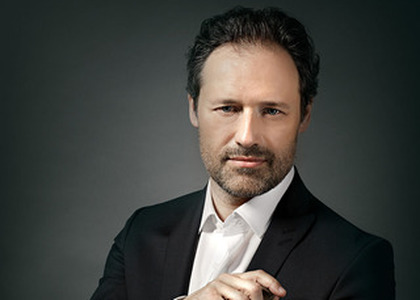> [Archived] Interviews

Interview with conductor Sascha Goetzel
On Friday, the 11th of October, the Radio Music Season opens with a concert in which two of the Radio ensembles - the National Radio Orchestra and the Academic Choir prepared by Ciprian Țuțu - will present Ludwig van Beethoven's Ninth Symphony in D minor, conducted by Sascha Goetzel. The Austrian musician spoke to our colleague Ioana Țintea about his return to the Radio.
Given your impressive repertoire, how do you relate to Beethoven's sound?
For all of us, whether we are involved in classical music or other fields, Beethoven is extraordinary. No other composer has influenced those who followed him so much. When we think of the Ninth Symphony, we are talking about a work that has inspired more than 150 years of musical creation. The symphony's structure is monumental, and each part brings a world of its own, reflecting Beethoven's compositional mastery. In the first movement, Beethoven brings incredible diversity, opening the Ninth Symphony with that fifth chord without a third. At first, we don't know whether we are in a major or minor key, and the mystery is maintained until it becomes clear that we are in a minor. But until then we are carried into an open universe full of possibilities. For me, this is a clear reference to the second Viennese school, where each note is equal to the others, constituting the fundamental dynamic for the development of the 12-tone system and atonality. Here we are already talking about over 100 years of musical history. What Beethoven does with the sound material of the first part is a self-destructive act. When he arrives at the coda bringing together all the themes of the first movement, he basically undermines his vision of music. The last chord marks a definitive closure, which I find fascinating.
The second part will be performed in its original version. Usually, in this scherzo movement, you hear the typical first repetition of Beethoven's scherzo, and the second repetition is not played, as this has become a tradition. I don't know exactly when this practice began, but it was certainly before my time, probably. From my point of view, the transition he makes when repeating is harmonically unique and special. You feel you're not completely relieved after the second movement if you don't play that section.
After all the excitement of the first two parts, we come to the third movement, which is amazing. It's hard to find words to express what we feel when we listen to it; it's as if an invisible guest is present in the orchestra, touching each of us, slowly, step by step, and this beautiful motif leads us to the stairs of heaven. Having gone through the self-destruction and the frantic dance to the end, with all the guilty pleasures and soulful fears, we come to something that has a deeper meaning, a spiritual one. We rise from the physical world into the spiritual world.
We play the last part attacca, without pause. Thus we move directly from this visit to heaven, this spiritual world of our human destiny, to the message that all men shall be made brothers - a message that is relevant today. For me, this is particularly important, because I have a deep belief in humanity. What makes this last part so special is that Beethoven allows us to experience our inner conflict. As well as introducing, for the first time in a symphony, a chorus complemented by soloists, it brings together all the fascinating elements of music history. From a musical point of view, the Ninth Symphony is a work that reveals to us the inner human turmoil, which is ultimately resolved through love.
In this world where each of us faces various difficulties and some of us fight for our lives every day, it is essential to convey this message through music: we believe in humanity and the power of love. That is why I think it was important to choose this work to open the new season with the National Radio Orchestra. Undoubtedly, we are in a dark time of our generation and it is important to create spaces where we can experience beauty and love. This is exactly the message we want to convey through this concert.
Finally, what are the arguments that convince you to come back to the Radio Hall every season?
I have a very close relationship with the musicians, and for me every time I come here is inspiring. It's hard work because we tackle difficult works and explore a wide range of repertoire: but together we enjoy the music. Right now, we are preparing to perform perhaps the most important work in all classical music, Beethoven's Ninth Symphony. This makes me very happy and that's why I come back again and again, because music and working with musicians brings me joy.
Translated by Miruna Flipache,
University of Bucharest, Faculty of Foreign Languages and Literatures, MTTLC, year II
Corrected by Silvia Petrescu














